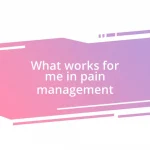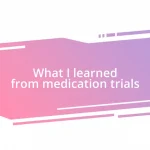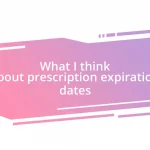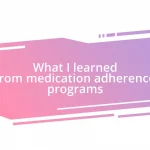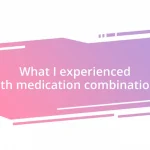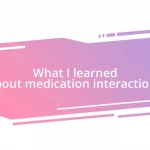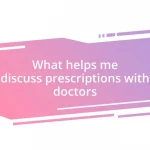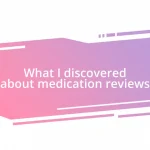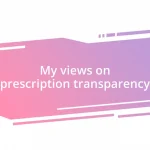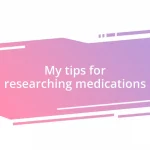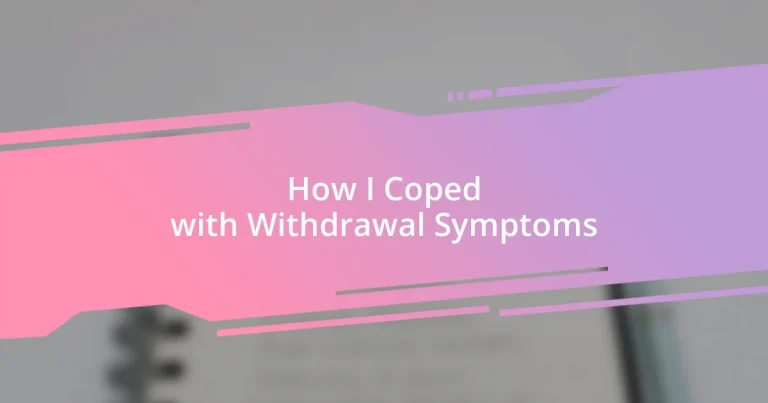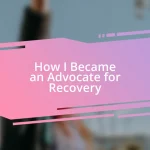Key takeaways:
- Understanding withdrawal symptoms is crucial for coping; individual experiences vary based on substance use and personal health.
- Identifying personal triggers, such as social situations and emotional states, helps in developing strategies to manage cravings effectively.
- Building a strong support system, including therapy and group sessions, fosters connection and accountability, enhancing the recovery journey.
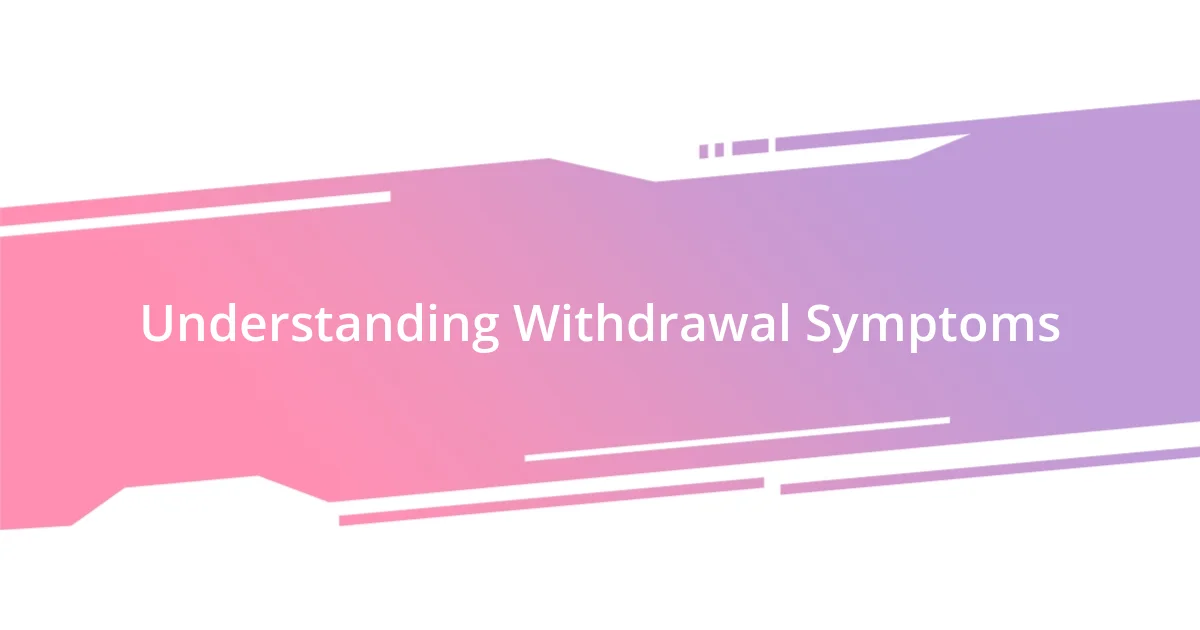
Understanding Withdrawal Symptoms
Withdrawal symptoms can be a daunting experience, often leaving individuals feeling isolated and overwhelmed. I remember staring blankly at the wall during one particularly tough night, questioning why I had decided to make this change. It’s a rough journey, as the body reacts to the absence of substances it has grown accustomed to, leading to a whole range of physical and emotional challenges.
When I first encountered withdrawal, each symptom felt like a puzzle piece of confusion. There were days when dizziness and fatigue pushed me to the brink, while moments of anxiety crept in like an unwelcome shadow. Have you ever felt your heart race for no apparent reason? In those moments, I realized that understanding these symptoms was crucial; they were my body’s way of re-adjusting and signaling that healing was underway.
It’s important to recognize that withdrawal symptoms can vary dramatically between individuals, influenced by factors like the type of substance, duration of use, and personal health history. I often found myself thinking, “Is this how everyone feels?” It turns out, grappling with these symptoms is a shared struggle, making it essential to connect with others who experience similar challenges—it helped me feel less alone in the process.
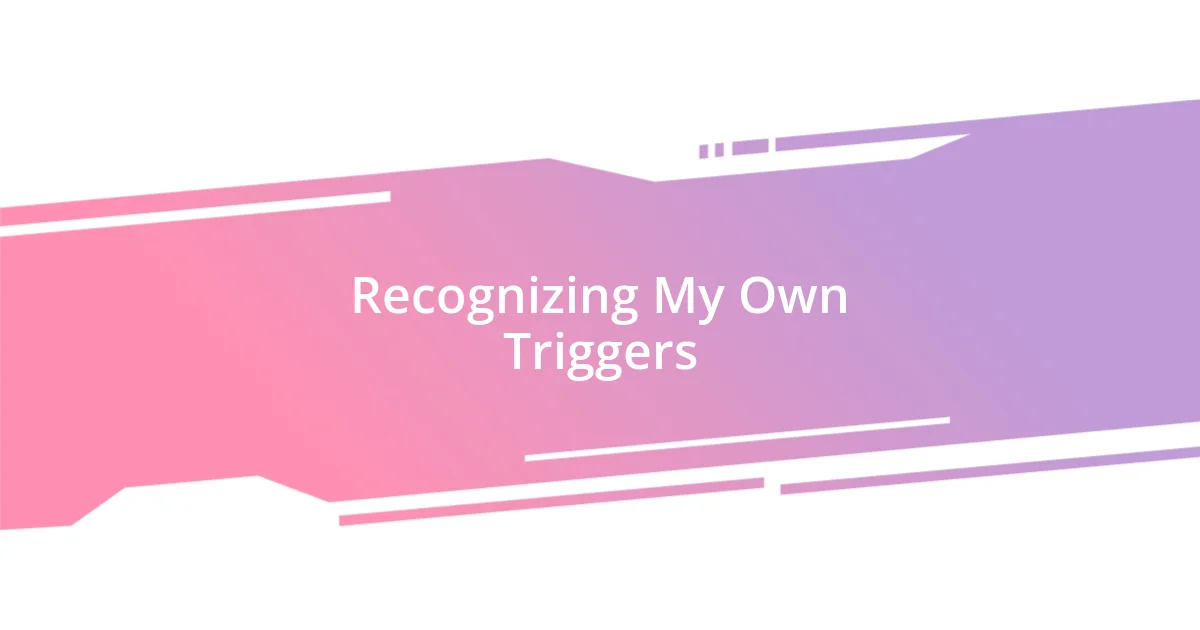
Recognizing My Own Triggers
Recognizing my triggers was a pivotal step in navigating withdrawal. I once found myself in a crowded café, and the overwhelming noise suddenly pulled me back to a time when I relied on substances to cope with social anxiety. That realization was a wake-up call; I had to learn what environments or situations heightened my feelings of distress.
Here are some common triggers I identified along the way:
- Social Situations: Loud gatherings or places where I felt judged brought up strong cravings.
- Stressful Events: Work deadlines or personal conflicts often led to an urge to revert back to old coping mechanisms.
- Certain Times of Day: I noticed that evenings were particularly difficult; they were often when I’d indulge before.
- Locations: Places associated with past use, like my old hangout spots, became instant triggers.
- Emotional States: Feelings of sadness or loneliness would creep in, nudging me toward familiar yet harmful habits.
Each trigger carried its own weight and emotion, but with time, I discovered strategies to face them head-on. I cultivated awareness, allowing me to navigate these moments with more confidence and resilience. It was about creating a new relationship with these triggers, rather than letting them control my actions.
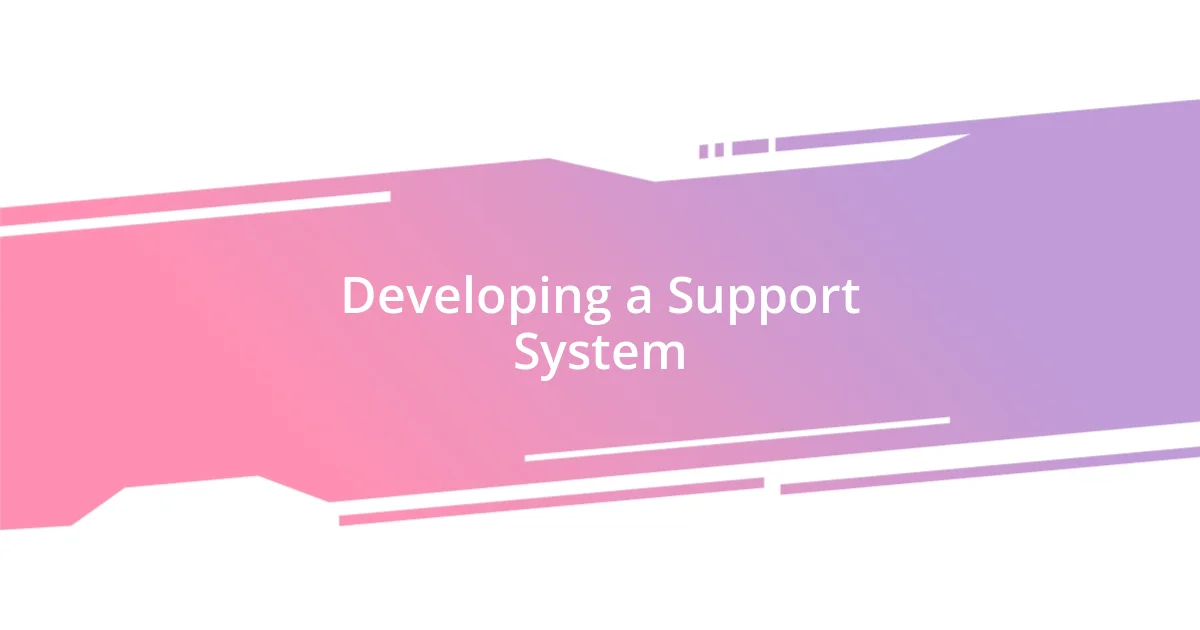
Developing a Support System
Developing a robust support system during withdrawal can be a game-changer. I vividly recall my friend texting me at midnight, just to check in. That small gesture felt incredibly grounding, reminding me that I wasn’t alone in this tough battle. Having someone who understands what I was going through made every tough moment feel a little lighter. Seeking out support from friends and family can create a safety net that catches us when we stumble.
In my experience, different types of support are essential for navigating this journey. I engaged in group therapy sessions, which allowed me to bond with others facing similar struggles. It’s remarkable how sharing stories and emotions with strangers can instantly create a sense of belonging. Have you ever shared a personal experience and felt a wave of relief wash over you? That connection reassured me that healing isn’t something we have to tackle in isolation.
Finding the right kind of support can take time and might require a bit of trial and error. I remember feeling hesitant to open up at first, but slowly, I found that reaching out to both support groups and trusted individuals made a profound difference. Ultimately, it’s about surrounding yourself with people who uplift you and help you stay accountable during difficult days.
| Type of Support | Benefits |
|---|---|
| Friends and Family | Emotional safety net and personal encouragement |
| Support Groups | Community understanding and shared experiences |
| Therapists/Counselors | Professional guidance and coping strategies |
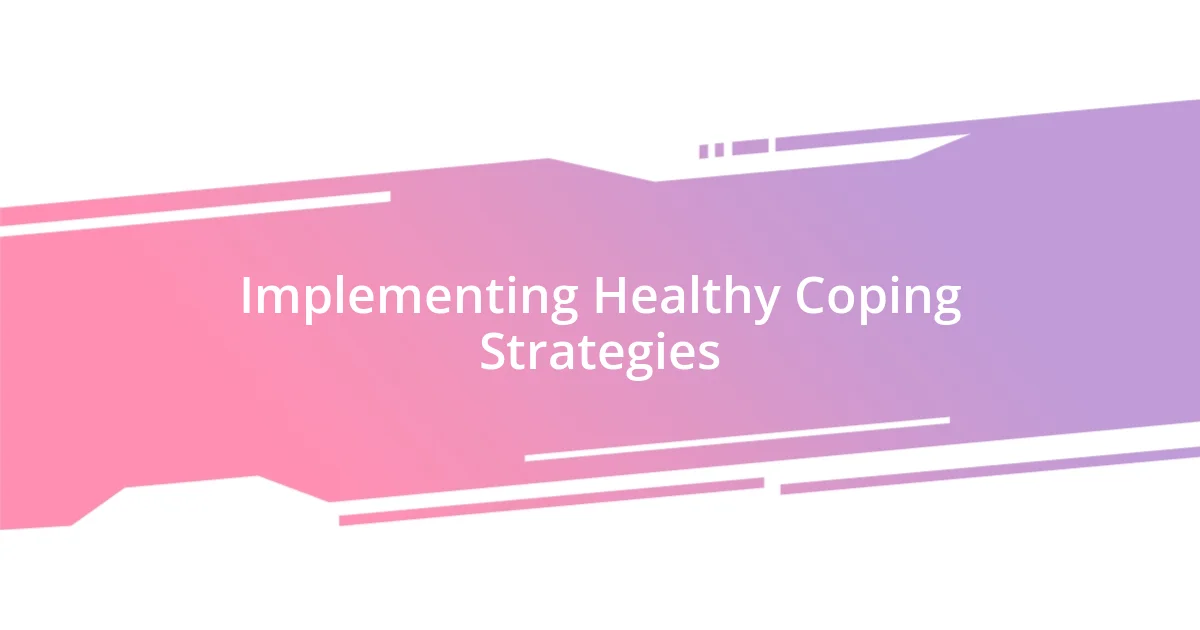
Implementing Healthy Coping Strategies
Implementing healthy coping strategies was essential for me during withdrawal. I remember one particular evening when cravings hit hard. Instead of giving in, I decided to take a walk in the park, letting the fresh air and nature ground me. Have you ever felt how a simple change in environment can shift your mindset? That walk not only distracted me but also helped me reconnect with my thoughts and feelings, which was incredibly therapeutic.
Another strategy that proved invaluable was creating a daily routine filled with positive activities. I made a commitment to myself to engage in yoga every morning. Initially, it seemed daunting, but the calming effects transformed my entire day. I found that focusing on my breath during practice provided a mental reset and a way to release built-up tension. What activities make you feel rejuvenated? Finding your own positive outlets can shift your focus away from cravings.
Lastly, journaling became a personal sanctuary for processing emotions. On days when I felt overwhelmed, I would pour my thoughts onto paper, letting my feelings flow freely. It became a safe space to articulate my struggles without fear of judgment. I often asked myself, “What am I truly feeling right now?” Exploring these emotions on paper not only clarified my thoughts but also allowed me to track my progress. If you haven’t tried journaling yet, I highly recommend it; you might discover hidden insights about yourself that help in your journey.
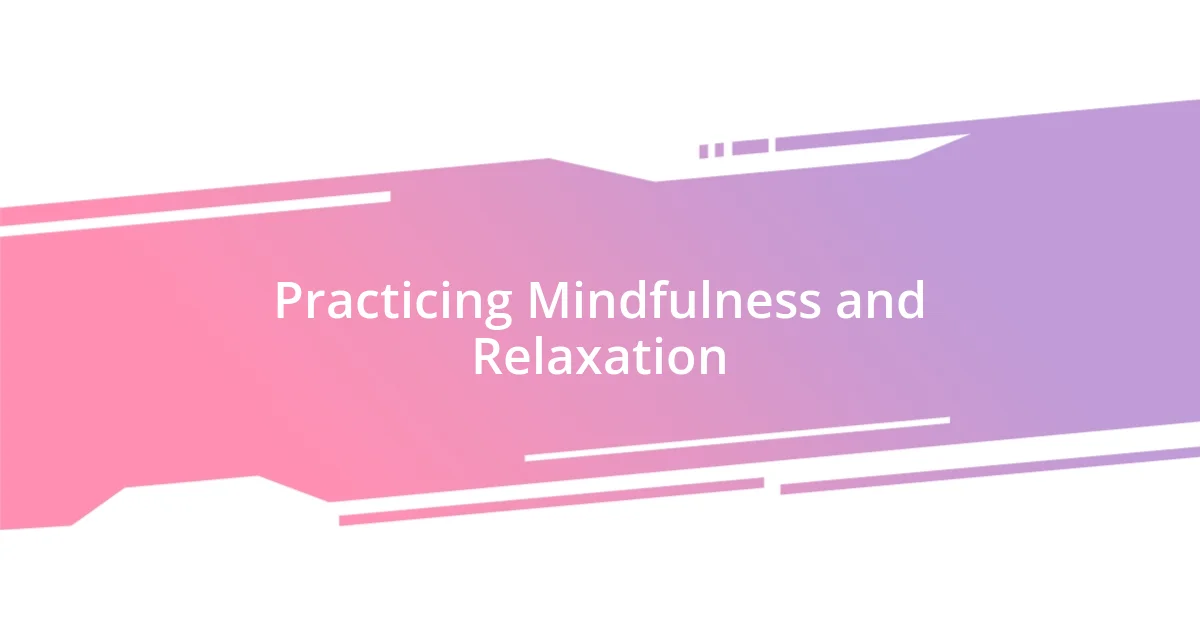
Practicing Mindfulness and Relaxation
Practicing mindfulness and relaxation can significantly ease the challenges of withdrawal. I remember my first experience with meditation; I sat there in silence, my mind racing, and thought, “How can this possibly help?” Over time, I learned that simply being present and focusing on my breathing created a space where my worries could fade, even if just for a few moments. Have you ever felt the world around you melt away when you focus on nothing but your breath?
In addition to meditation, I found that progressive muscle relaxation was a game-changer for calming my body. Initially, I didn’t realize how tightly wound I was until I actively tried to release that tension. Each evening, I would lie down and consciously relax one muscle group at a time, and it felt like a wave of serenity washing over me. I often paused and thought to myself, “This is what my body needed.” How often do we forget to simply check in with ourselves?
Incorporating mindfulness into daily activities also made a world of difference. I began to pay attention while washing dishes—feeling the warmth of the water and the texture of the soap. That small shift turned a mundane task into a moment of connection with myself. I started to wonder, “Can these tiny moments of awareness transform my overall mindset?” I truly believe they can, as those moments added up to create a calmer, more centered me. Embracing mindfulness in everyday life has been one of my most profound lessons during this journey.
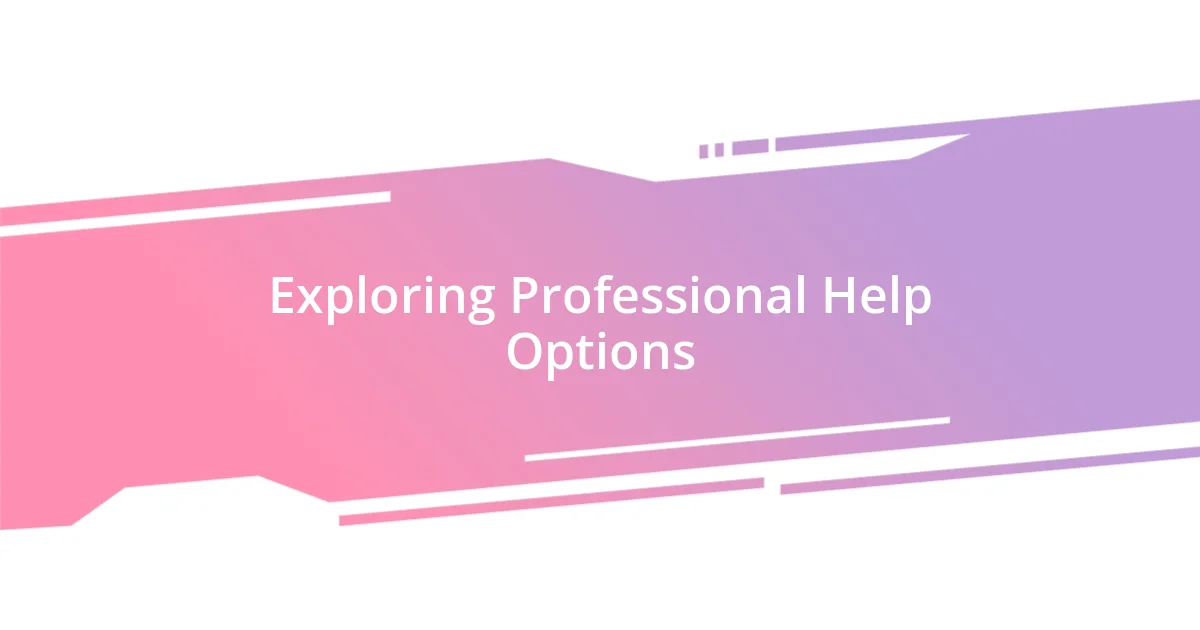
Exploring Professional Help Options
When considering professional help options, I found it crucial to explore therapy as a viable avenue. I remember walking into my first appointment with a mix of fear and relief. The therapist’s calm demeanor immediately made me feel at ease, and I realized how important it was to talk to someone who understood my struggles. Have you ever felt the weight of your thoughts lift after sharing them with a sympathetic ear?
Additionally, group therapy sessions turned out to be a valuable experience. Initially, I hesitated to divulge my story among strangers. However, as I listened to others share their journeys, I discovered a profound sense of connection. In those moments, I felt less alone, as if a collective understanding wrapped around us. I started to ask myself, “Could this be a turning point in my healing process?” It truly was, as the shared vulnerability created an environment of support that I desperately needed.
Finally, seeking medical advice for withdrawal symptoms should not be underestimated. I vividly recall my visit to a physician who not only explained the physiological aspects of withdrawal but also outlined a personalized plan for me. There was something incredibly comforting in having a structured approach to my healing journey. Have you considered how a professional assessment might clarify your path forward? That combination of expertise and empathy made all the difference in my recovery process.
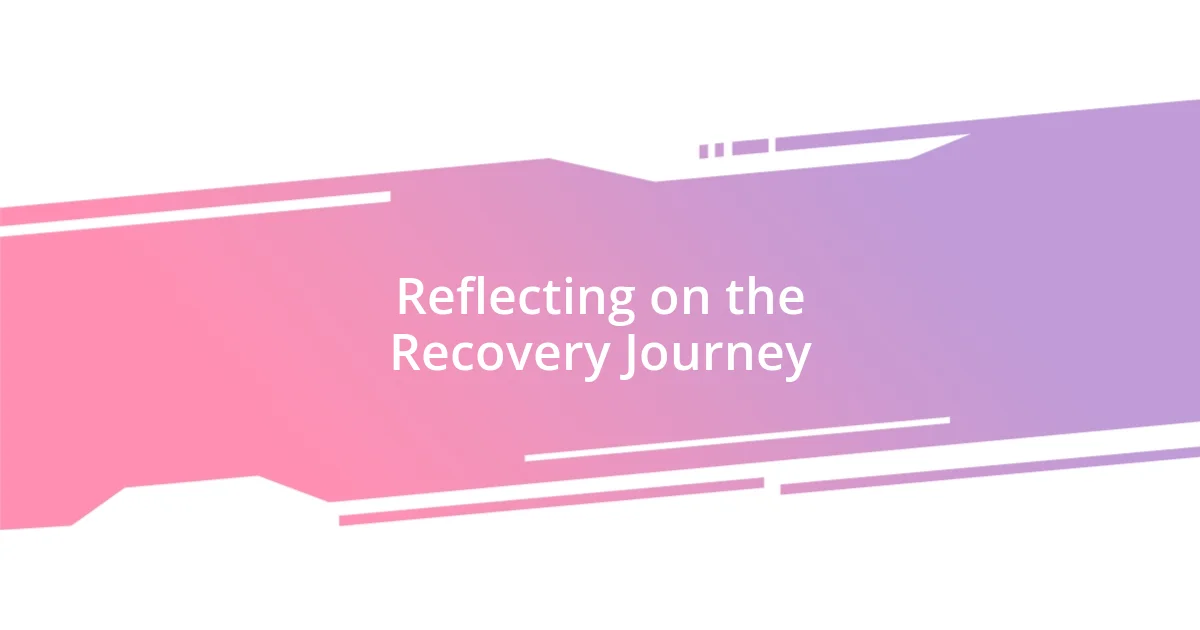
Reflecting on the Recovery Journey
Reflecting on my recovery journey has been an emotional rollercoaster, one filled with both challenges and triumphs. I still remember those early days, where every small victory, like getting out of bed or preparing a meal, felt monumental. Have you ever celebrated a seemingly insignificant achievement only to realize it was a crucial step forward? Those moments taught me the beauty of resilience in the face of adversity.
I often think about the connections I formed along the way, particularly with others who were navigating similar waters. It was during a quiet evening, chatting over tea with a fellow recoverer, that I realized how much sharing our stories can lighten the emotional load. Each shared experience seemed to weave another thread in the fabric of my healing, reminding me, “You’re not alone in this.” How often do we overlook the power of community when we’re fighting our battles?
As I sift through the memories of my past struggles, I’ve come to appreciate the lessons learned through each relapse and setback. Reflecting on those moments can be painful, yet they offer a glimpse into my growth. I often ponder, “What if every challenge I faced was merely a stepping stone towards becoming a stronger version of myself?” Embracing this thought shifted my perspective, shedding light on the idea that every experience has a purpose in shaping who I am today.
